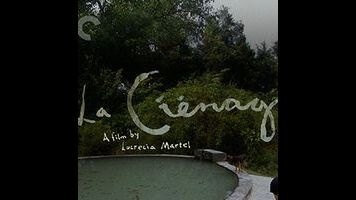Lucrecia Martel’s budding talent is on display in La Ciénaga

The title of Argentine director Lucrecia Martel’s first feature, made in 2001, translates to The Swamp. There’s an actual swamp in the movie—early on, a bunch of kids find a cow trapped in its muddy depths, returning days later to put it out of its misery—but Martel makes her metaphorical intention clear in the opening scene, which depicts a group of bourgeois adults lazing around beside a filthy backyard pool. When they need to move their deck chairs, they don’t lift them, but instead drag them slowly across the ground, creating a metal-on-concrete noise that suggests what it might sound like if you could hear something rust. (The newly released Criterion edition of the film uses this singular effect to accompany its main menu.) The sequence is a tour de force of somnolent atmosphere, wordless and pitiless. It’s also incredibly blunt, and La Ciénaga in general finds Martel, who’s since made subtler, superior films like The Holy Girl (2004) and The Headless Woman (2008), still working out some bugs in her style.
Unlike those two later films, each of which mostly focuses on a single protagonist, this largely plotless portrait of malaise features a sprawling ensemble involving a couple of extended families. One is ruled by Mecha (Graciela Borges), who falls while carrying some drinks in that opening pool scene and badly cuts her chest on the broken glass. (None of the half-dozen adults present so much as glance in her direction, much less rush to help her; her kids, who see the accident from an upstairs window, come to her aid.) Whining from her bed about her sorry lot in life—including the utter uselessness of her husband, Gregorio (Martín Adjemián)—Mecha makes a plan to go on a shopping trip in Bolivia with best friend Tali (Mercedes Morán), who’s experiencing her own intense feelings of dissatisfaction. Other subplots involve Tali’s youngest son, who’s terrified after hearing a story about a dog-sized rat; a recurring TV-news report about a woman who claims to have seen the Virgin Mary; and the unrequited attention that Mecha and Gregorio’s teenage daughter, Momi (Sofia Bertolotto), pays to the live-in maid, Isabel (Andrea Lopez).
This last element illustrates the significant leap forward that Martel made over the course of her next two films. (It’s been seven years since The Headless Woman, but she’s reportedly finally prepping her fourth.) Isabel is an Argentine Amerindian, which makes her a second-class citizen; Mecha repeatedly accuses her of stealing towels and spends the entire film, in common with numerous other characters, making casual racist slurs about “those Indians,” all of whom seem to work in some menial capacity. The Headless Woman tackles this pervasive racism as well, but it does so with considerably more nuance, exploring the ways in which such marginalization can be difficult to perceive. La Ciénaga is reportedly autobiographical, and it’s entirely possible that it accurately represents Martel’s memories of her own family; nonetheless, her concerns are so conspicuous, resting right on the film’s surface, that they leave little room for the viewer to do anything other than mutter “tsk, tsk.” The mystery that permeates her later work is absent.
Still, her talent was instantly recognizable, and those who haven’t yet discovered Martel are encouraged to start at the beginning and work their way forward. La Ciénaga finds her playing around with the use of both offscreen space and offscreen noises, both of which become even more significant in subsequent films. And unlike the bare-bones DVDs for The Holy Girl and The Headless Woman, Criterion’s edition of this film includes an interview with Martel that illuminates her distinctive approach to the medium. (Sadly, it doesn’t include any of the half-dozen short films she’s made, several of which are animated and were made in the late ’80s and early ’90s. Finding these with English subtitles is next to impossible.) At the time of its initial release, La Ciénaga merely looked mildly promising. Now that said promise has been fulfilled, it’s a fascinating, if often maddening, look at the uncertain first steps of a major director.
La Ciénaga is available on Blu-ray and DVD from Criterion.